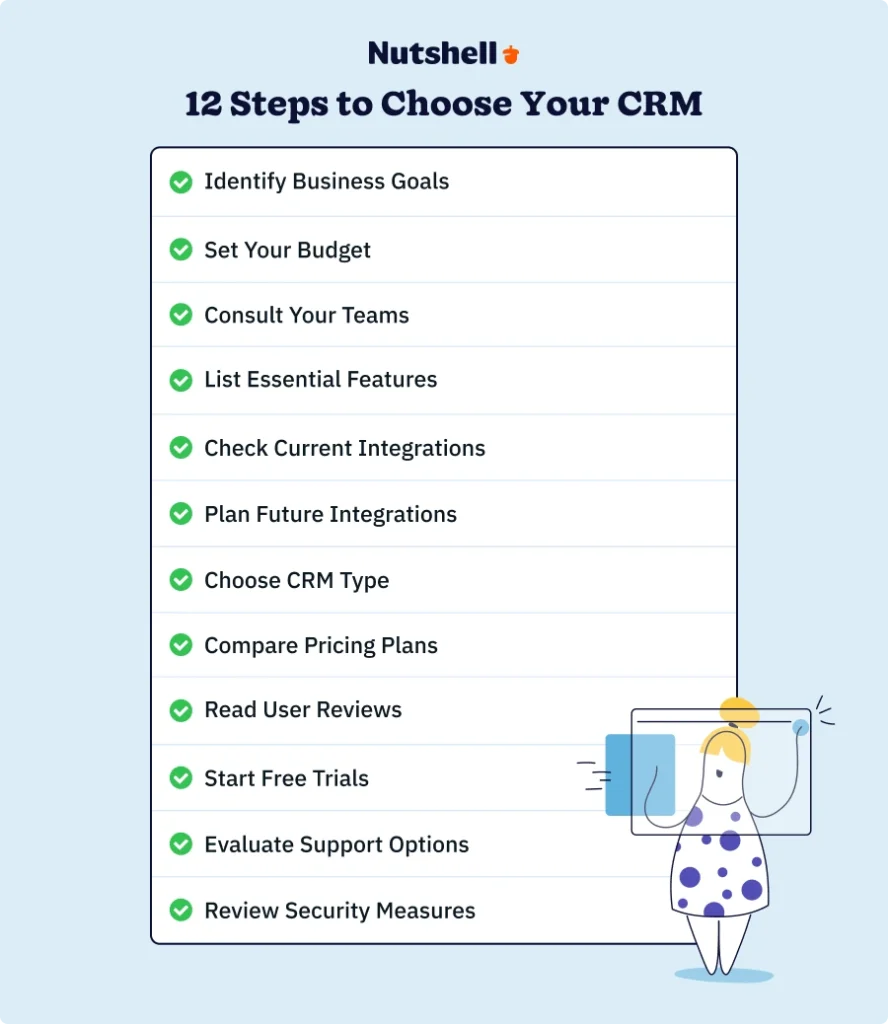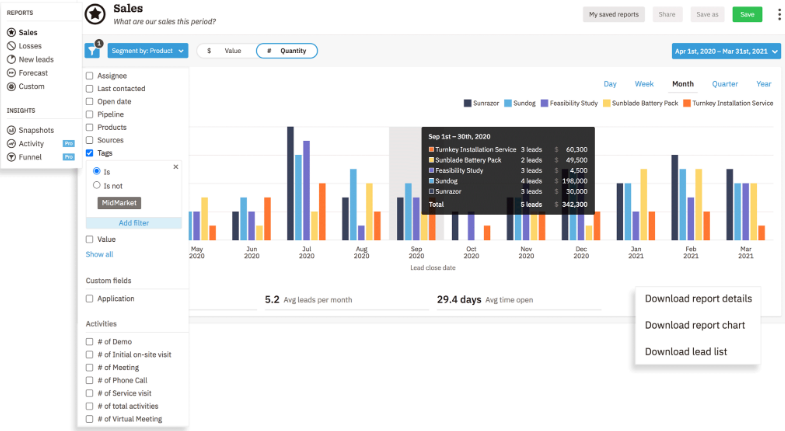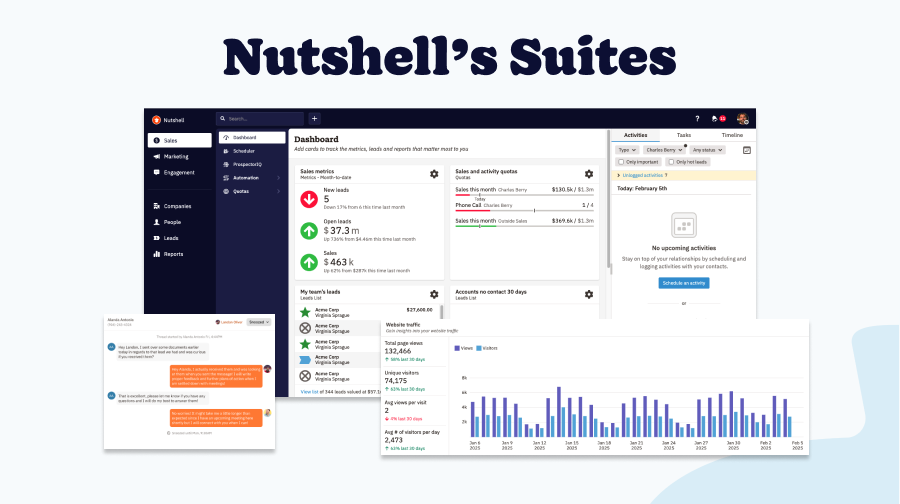See Nutshell in action!
Try Nutshell free for 14 days or let us show you around before you dive in.

A customer relationship management (CRM) platform is one of the most critical investments you’ll make in your business infrastructure. But here’s what most guides won’t tell you upfront: choosing the wrong CRM isn’t just inconvenient—it can actively hurt your growth.
According to Salesforce’s 2024 State of Sales report, 43% of CRM implementations fail to meet their objectives. The culprit? Most businesses focus on features lists instead of asking the fundamental question: “Will my team actually use this?”
For small to medium-sized businesses, the stakes are even higher. You’re not just looking for software—you’re looking for a system that saves time, not creates more work. You need a CRM that your sales team will embrace on day one, not one that requires months of training and a dedicated administrator.
The good news: businesses that choose the right CRM see measurable results quickly. Companies using CRM report an average ROI of $8.71 for every dollar spent, along with a 29% increase in sales, 34% boost in productivity, and 42% improvement in forecast accuracy. But those results only come when you match the right system to your specific needs.
This guide walks you through exactly how to make that choice—without the overwhelm, without the jargon, and without wasting months evaluating options that were never right for you in the first place.
Before we dive into what to do, let’s talk about what to avoid. These are the most common mistakes that lead to failed CRM implementations:
Picking software before defining requirements. You wouldn’t buy a vehicle without knowing whether you need to haul equipment or commute downtown. The same principle applies to CRM. Starting with vendor demos before you understand your needs leads to expensive mismatches.
Ignoring the people who’ll use it daily. IT teams love technical specifications. Executives love dashboard reports. But nobody asks the sales reps who’ll actually live in the system eight hours a day whether it makes their job easier or harder.
Assuming “more features” means “better value.” Enterprise CRMs like Salesforce offer hundreds of features, but a 12-person team doesn’t need (and won’t use) 90% of them. You’ll pay for complexity you don’t need while your team drowns in unnecessary options.
Underestimating the change management challenge. You can build the perfect technical system, but if your team doesn’t adopt it, you’ve just created an expensive digital filing cabinet. According to recent research, only 7% of businesses feel very confident in their CRM implementation—meaning 93% struggle with adoption.
Choosing based on brand recognition alone. The most well-known CRM isn’t automatically the best fit for your business. In fact, many SMBs that start with big-name platforms end up migrating to simpler alternatives within 12 to 18 months because the complexity outweighs the benefits.
Several factors should contribute to your CRM choice. You may be struggling to figure out what those factors are, but don’t worry—we’ve got you covered.

Here are 12 tips on how to choose a CRM!
One of the very first things you should do before you begin considering CRM options is to identify your business needs and goals. What does that mean? Basically, it means you need to figure out what exactly you intend to use your CRM for.
This is important when choosing your CRM because every CRM is built differently, and not all of them include or prioritize the same features. So, you need to know in advance what you want to do with the platform. Is your priority customer segmentation? Email marketing automation? Sales analytics?
Make sure you decide early on what you want the platform for because that will make things much easier later on.
Once you’ve laid out your primary goals for your CRM, the next thing to clarify is your budget. This goes without saying, but you don’t want to spend time considering CRMs you aren’t willing to pay for.
Setting a budget allows you to quickly rule out anything that costs more than the maximum amount you’re willing to pay. It can also help you eliminate overly cheap platforms—if you set a relatively high budget, you probably don’t want to settle for a platform that costs a tenth of that and has limited functionality.
Related: How much does CRM cost?
Something to bear in mind when you choose CRM software for your business is who will be using it. In all likelihood, you have a few specific teams that will be using the CRM each day—most likely your sales, marketing, and customer service teams—and as such, their input matters most when it comes to this decision.
Take the time to talk to those teams and get their insight on how they expect to use the CRM, what sorts of capabilities they want it to have, and more. After all, they’ll be the ones who have to use it each day, so they’re arguably the most qualified people to advise you on the right choice.
Ready to become the best sales manager for your team? Get 70+ leading tips and strategies from the experts for sales management success with our Sales Manager’s Survival Guide.

In the first tip, we established that you should determine your goals for your CRM and what you intend to use it for. Now, it’s time to translate those general goals into specific CRM features. What precise capabilities do you want your CRM to have? What tools do you want it to include?
Be sure to establish your top priorities, the things your CRM absolutely must have, and then add some features you’d prefer for it to have. You can use that list of features to quickly rule out any CRMs that don’t have all of them.
CRMs can do a lot for your business, including streamlining your sales pipeline, organizing customer information, and enabling more effective marketing campaigns.
Whichever CRM software you choose, it needs to have all (or at least most) of the features you’re looking for. But what features should you prioritize?
To some extent, it depends on your company’s specific needs. That said, there are several different core CRM features you should be sure to look out for, including:
We’ll briefly review those features below.
The most fundamental feature of any CRM is data gathering and storing. Since the data concerns your leads and customers, part of that feature includes contact and lead management.
Basically, the CRM you choose should be capable of storing leads and contacts based on the data it gathers. This allows you to easily identify sales opportunities and streamline your overall sales process.
Another crucial CRM feature is sales forecasting and reporting. These features involve the CRM using the data it’s collected to generate reports, which can show patterns and trends in your audience and predict future sales.
To get the most value from your data, you need to analyze and report on it, so it makes perfect sense to pick a CRM that can perform that analysis. Otherwise, you’ll have to find another analytics tool to complement the CRM.

Marketing and sales automation is another important feature to consider when choosing a CRM system. Automation features allow your CRM to handle mundane, day-to-day marketing and sales tasks for you. For example, your CRM could automatically send a marketing email to leads when they take a particular action.
The advantage of automation is that it frees your team from spending all their time on those simple tasks, allowing them to focus on other things while the CRM handles the repetitive, day-to-day work.
Most CRMs generate reports and include a dashboard that summarizes the sales metrics that are most important to your business goals. Of course, not every business considers the same metrics to be its top priority. That’s why you should look for a CRM that lets you customize your dashboard.
A customizable dashboard lets you choose which metrics it shows, tailoring it to the specific needs of your company and individual team members. Ideally, you can do the same with more in-depth reports, building them with the particular metrics you choose. If a CRM can’t do those things, it might not provide the data analysis you need.

CRMs are built around sales, and sales don’t always take place in the convenience of your office. You may often earn a new lead or customer while away from your office. In those cases, you’ll want to be able to update or check your CRM quickly.
For that reason, choose a cloud-based CRM that you can access from your phone as well as your computer. Moreover, make sure the mobile version of the CRM is easily usable and navigable.
Take our guided tour to explore Nutshell’s incredible features!

Your business already uses multiple sales and marketing tools to get the job done, from cloud document storage platforms to accounting software. Integrating those tools with your CRM allows you to sync your data across all the software you use and maintain up-to-date, accurate information where you need it most.
When you choose a CRM, make sure you find one that can integrate with a wide variety of tools—or, at the very least, with most of the data tools you use at your company. Otherwise, you’ll have a tough time automatically syncing your data.
Here are some of the most common types of integrations you may want to look for in a CRM solution:
Whether a CRM integrates with your existing tools is only one piece of the puzzle of whether it will work for your company long-term. Suppose you use one email marketing platform but, over time, discover that a different one suits your needs better. What happens when you switch to the new platform, but your CRM can’t keep up with the change?
A CRM that integrates with multiple email marketing solutions is better than one that only offers a single integration. That type of flexibility gives your business more options for accomplishing your goals.
Be sure to look for a CRM that also offers integrations with software similar to what you’re using, which can help increase your efficiency. For example, if your business uses Google Drive as a collaboration tool, you could also look for a CRM that integrates with your Gmail and Google Calendar accounts so you can stay synced across your platforms.
CRM companies may also be able to build custom solutions through third-party tools like Zapier. Zapier creates connections between web applications. This solution may be a way to create an integration that you couldn’t have otherwise.
Remember that some CRMs also have sales and marketing tools built right into them, such as email marketing tools and online form builders. These native capabilities eliminate the need to integrate certain types of third-party tools altogether, allowing your team to accomplish even more without ever leaving your CRM platform.
Not all CRMs work the same way. There are multiple types of CRMs out there, and you should consider which one you want to use.
To start with, you’ll need to choose between cloud CRMs and on-premise CRMs. Cloud CRMs store all your data in the cloud, meaning you only need an Internet connection to access you CRM. On-premise CRMs, meanwhile, are hosted on servers at your business’s physical location.
You also need to consider that some CRMs are specialized for certain types of businesses. If your company is a large enterprise, look for a CRM built for enterprises. And if you’re a small business, find a CRM geared toward small businesses.
After you’ve compared a CRM’s features and integration options, it’s also critical to consider the software’s pricing. Bear in mind some of the most important considerations as you compare CRM pricing.
Comparing CRMs by price is generally straightforward. After all, it’s not complicated to simply compare different CRMs and look at which ones cost the least.
However, diving deeper into individual plan offerings can take time and effort. CRM plans include different features, enable different capabilities, and come at various price points. A vital aspect of comparing CRM pricing is considering what you get with each plan.
It’s also important to remember that with CRMs, you often get what you pay for. The cheapest options are probably the cheapest for a reason, offering the fewest features and functions.
Customer reviews can be helpful tools for determining whether a CRM works for other businesses, particularly those in your industry. Read reviews by verified users posted on a reputable software review site like G2 so you can feel confident in their validity.
When you’ve narrowed it down to a handful, be sure to focus not only on how positive the reviews are but on how many there are. Maybe one CRM has a 5-star rating on a particular site while another has a 4.7-star rating. However, if the 5-star CRM only has three reviews while the 4.7-star CRM has 300, it might be better to go for the second option.
Three reviews aren’t enough to be confident about a CRM’s quality, but if a CRM maintains a 4.7-star rating after receiving 300 reviews, that’s promising.
Also, be sure to look at why CRMs receive positive reviews. Reviews for one CRM might praise things you don’t care about, while reviews for another may highlight precisely what interests you.
When reading reviews, look for information about customer support. Even with the best CRM in the world, you’ll still occasionally have questions or concerns that a support team can help with. Friendly, thorough, and efficient customer support is a must for every CRM user.
Some CRMs charge for customer support. However, it’s impossible to predict how frequently you may need to contact the support team, and you don’t want to pay a higher price just to get in touch with a support person. A CRM that provides free support services in your chosen plan can make a world of difference when your team hits a roadblock.
Before you make a decision, you should test out some CRMs for yourself. How can you do this? Simple—through free trials. Many CRMs allow you to spend a week or two using the tool for free so you can see what it’s capable of. Take advantage of this by testing out all your top preferences.
As you try out the CRMs, use as many of the features as possible so you don’t miss anything. Also, pay close attention to the overall user experience so you can see how easy it will be for your team to use it. You can also allow your marketing and sales teams to spend time on it since they’ll use it in the long term.
Related: Download our CRM comparison worksheet
One of the things you should assess when testing CRM software is the level of customer support. First, what type of support does the company offer? Second, how responsive and knowledgeable is the organization’s support team?
The different types of support you might encounter include:
You may also come across CRM services that offer 24/7 support, while other support teams may only be available during specific hours. Consider all these customer support variables to determine what works best for your business’s needs.
Then, reach out to the customer support teams to see how responsive they are and how quickly they can resolve your query.
Keeping your customer data safe should be a top priority, and your chosen CRM should provide you with essential data security features at the very least. Ideally, you’ll want a CRM that offers these vital security measures:
You should also ensure that the CRM complies with the rules and regulations of the region where its data is stored. Unless you opt for an on-premises CRM solution, your cloud-based CRM service will have host servers stationed somewhere and possibly in a different country. Double-check any local restrictions regarding collecting and storing customer data to ensure your CRM is compliant.
Choosing a CRM may not be something you can do in five minutes, but it doesn’t have to be stressful, either. Whatever your CRM choice ends up being, the above steps will help you make sure it’s the right one. Having said that, allow us to simplify the process a bit for you.
If you’re a small business, Nutshell is the perfect CRM for you. It allows you to automate sales tasks like email marketing, get advanced reports on virtually any sales metric of your choosing, and quickly categorize leads into all sorts of groups.
Want to see for yourself? Just follow our last tip from above—check out our free trial. It lasts 14 days, giving you plenty of time to see how much Nutshell can benefit you. Get started today!
Implementation timelines vary dramatically based on system complexity. SMB-focused CRMs typically take two to four weeks from signup to full team adoption, including data import and training. Mid-tier systems require four to eight weeks, while enterprise CRMs with heavy customization can take three to six months or longer. For small to medium-sized businesses, faster implementation means faster ROI—every month spent implementing is a month you’re not benefiting from your investment.
The most common mistake is prioritizing features over usability. Businesses get dazzled by impressive demo presentations and extensive feature lists, then choose a system that’s too complex for their team to use comfortably. This leads directly to poor adoption, which is why 20% of CRM users switch systems due to usability issues. Instead, focus on whether your team will actually use the system daily. A simpler CRM that gets used consistently beats a feature-rich platform that sits empty.
Yes, but choose carefully. Even solo businesses benefit from centralized customer information, automated follow-ups, and systematic processes. However, you don’t need (and shouldn’t pay for) enterprise features. Look for CRMs specifically designed for small teams that emphasize simplicity and automation over complexity. The right CRM should save you time immediately, not create a learning curve that slows you down.
Yes, but it’s disruptive and time-consuming. Switching involves data migration, team retraining, and workflow reconstruction—all while trying to maintain business operations. According to industry research, the average CRM migration takes four to six weeks for SMBs and can cost thousands in lost productivity. This is why getting it right the first time matters. Take the trial period seriously, involve your whole team, and test real workflows rather than generic scenarios.
User adoption starts with choosing a CRM that makes work easier, not harder. Beyond that, successful adoption requires clear expectations (CRM usage isn’t optional), visible leadership commitment (if managers don’t use it, teams won’t either), integrated workflows (make CRM part of how work gets done, not an extra step), quick wins (celebrate early successes publicly), and ongoing support (designate CRM champions who can answer questions). Remember: only 7% of businesses feel very confident in their CRM processes, which means 93% struggle with adoption. You’re not alone if this feels challenging.
Data shows that 65% of businesses adopt CRM within their first five years, and earlier adoption generally leads to better outcomes. Why? Because CRM helps you build scalable processes from the start rather than trying to retrofit systems later. If you’re currently managing customer information in spreadsheets, sticky notes, or scattered emails, you’ve already outgrown those methods—you just haven’t made the transition yet. The question isn’t “Am I too small for CRM?” but rather “How much time am I wasting on manual work that CRM could automate?”
It depends on your industry’s unique requirements. Some industries—like real estate, healthcare, or nonprofit fundraising—have specialized workflows that benefit from industry-specific CRMs. However, general-purpose CRMs often provide better long-term flexibility and more robust features. Before paying a premium for industry-specific software, evaluate whether you truly need those specialized features or if customizable workflows in a general CRM would serve you just as well.
Extremely important if your team works outside the office. Statistics show that 70% of businesses use mobile CRM to enhance sales effectiveness, and companies using mobile CRM are 150% more likely to exceed sales targets. If your sales team meets clients off-site, attends trade shows, or works remotely, mobile functionality isn’t optional—it’s essential. During your trial, specifically test the mobile experience. Can your team quickly log calls, update deals, and access customer history from their phones? If mobile feels like an afterthought, keep looking.
Try Nutshell free for 14 days or let us show you around before you dive in.




Join 30,000+ other sales and marketing professionals. Subscribe to our Sell to Win newsletter!